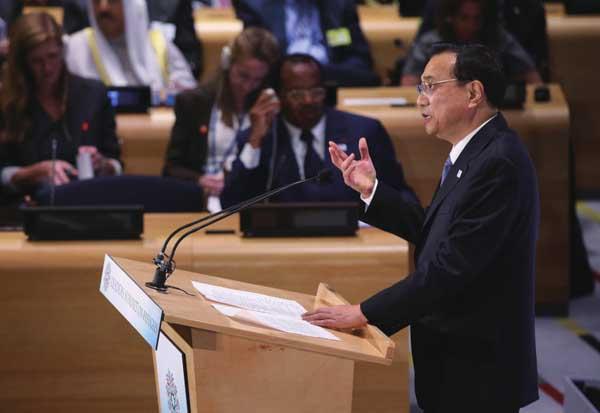The Door Will Not Close
2016-05-14ByCorrieDosh
By Corrie Dosh

Amid the wave of nationalism and protectionism that is sweeping the world—with the United Kingdom voting to leave the European Union and Donald Trump threatening to derail the North American Free Trade Agreement if he is elected president of the United States—the 71st session of the UN General Assembly convened in New York City on September 13 to advocate globalization and international cooperation. Leaders from around the world pledged the equivalent of billions of U.S. dollars to confront threats ranging from armed conflict and radicalization to environmental protection and poverty.
After 10 years as UN Secretary General, Ban Ki-moon told the assembly he is “more convinced than ever that we have the power to end war, poverty and persecution.”
“We have the means to prevent conflict. We have the potential to close the gap between rich and poor and to make rights real in peoples lives,” he said.
Voice from China
Perhaps no nation has seen such a dramatic shift toward globalization as China. Over the past four decades, the country has transformed from a closed society to the largest trading nation in the world. China is the worlds second largest importer of goods and has the fastest growing consumer market. When China speaks about trade, the world listens.
“We cannot give up eating for fear of choking,” Chinese Premier Li Keqiang said in his address to the assembly, pledging to continue a path toward free trade while acknowledging that “certain groups and sectors” may be affected in economic globalization.
“Economic globalization is in the long term interest of all countries. All parties must resolutely oppose all kinds of protectionism and uphold the free trade system of the World Trade Organization,” Li said.
The door to Chinas markets will only open wider in the years to come, Li said, assuring global leaders that market reforms will continue and that China will be a good trading partner. The nations experience in the past decades has “proven that a closeddoor policy only leads to stagnation and backwardness.”
“We are resolute and steadfast in adhering to this development path,” he said.
To foster the UNs objectives, major economies need to coordinate macroeconomic policy while considering their own growth and to employ policy in a holistic manner for demand management and supply-side reform, Li told the assembly.
To support the global aims of poverty reduction and peace, Li pledged $300 million in aid to the UN along with support for developing countries, especially in Africa. The premier called for denuclearization and dialogue to solve global conflicts, particularly in the case of North Korea, which has rattled its neighbors with a series of nuclear missile tests. China and the United States have begun discussions on a possible UN sanctions resolution against North Korea and have agreed to step up cooperation in the UN Security Council and in law enforcement channels.
China is now well situated in its role as a responsible player. The UN General Assemblys current session is the first that Li has attended as premier of China, and on September 19, he chaired a symposium on sustainable development and held several high-level meetings with the secretary general and heads of state. Li indicated China will play a more significant role in international efforts to deal with the Syrian conflict by providing aid and training to the Syrian Government and inviting opposition leaders for talks to promote a political settlement.
Following on from Chinas accession to the International Organization for Migration in July, Li also attended a high-level summit on the issue of refugees and migrants fleeing conflict and poverty. According to the Office of the UN High Commissioner for Refugees,an unprecedented 65.3 million people, including 21.3 million refugees, were displaced worldwide in 2015. China plans to provide an additional $100 million to help deal with the global refugee and migrant crisis and is also considering setting aside a $1 billion fund for the purpose, Li said at the summit.
Business concerns
On September 20, Li spoke at a business dinner and responded to complaints about protectionism in Chinas markets, according to Reuters, saying that China is open to foreign investment despite the immaturity of some economic sectors.
“This process of them becoming more mature is also a process for them to open up. And, the areas of Chinas economy open to foreign investment will only increase, and China will only open its door even wider. The door will not close,” he said.
As an example of Chinas willingness to open up its markets, Li said while China had designated one of its own banks as the first clearing institution for renminbi business in New York, it welcomes non-Chinese banks in the city which meet eligibility requirements to become clearing banks as well.
Chinas central bank authorized Bank of Chinas New York branch as the first official renminbi clearing institution in the city on September 21. The establishment of a renminbi clearing bank in the United States will promote the growth of activity with the currency in the region and help accommodate increased demand for renminbi products and services, said Timothy Geithner, former U.S. Treasury Secretary, according to a report by the Financial Times.
Opening the door for U.S. banks to become renminbi clearing institutions will facilitate offshore trading and cross-border payments with the currency, thanks to the banks access to Chinas foreign exchange market and their ability to provide liquidity to offshore centers.
Li addressed concerns relating to its currency, assuring investors that there was no basis for continued yuan depreciation and that China would not use devaluation of its currency to boost exports. The yuan becomes the fifth currency in the International Monetary Funds basket of Special Drawing Rights on October 1, a milestone that China considers as key to the internationalization of its currency and a vindication of its economic policies.
Li also mentioned the hope that the bilateral investment treaty (BIT) between China and the United States would remain viable, despite floundering negotiations over the pact, which are now in their 29th round. Li said China had made strong efforts in the negotiations over the past two years and that it is “now waiting for a response from the U.S. side.”
Although both Trump and Hillary Clinton have talked tough on trade in the lead up to the U.S. election—with Trump threatening to impose new tariffs on goods from China, and Clinton backing away from an unpopular regional trade agreement—Li said relations between China and the United States would continue to improve in the long term.
“No matter who gets elected in the U.S. presidential election, I believe that China-U.S. ties will continue to grow steadily and in a positive direction,” he said.
